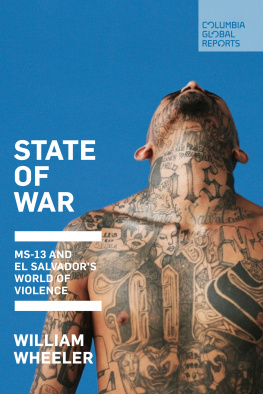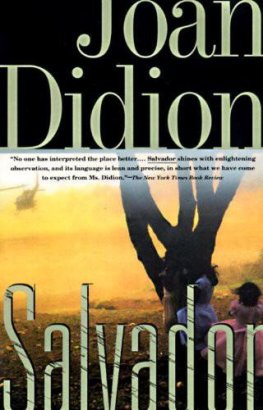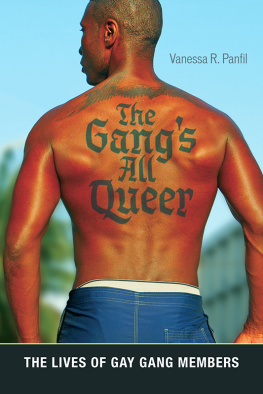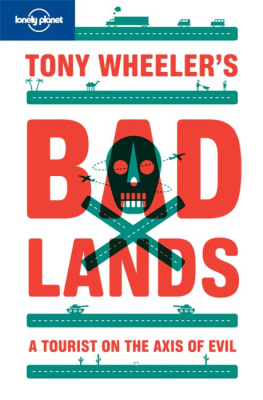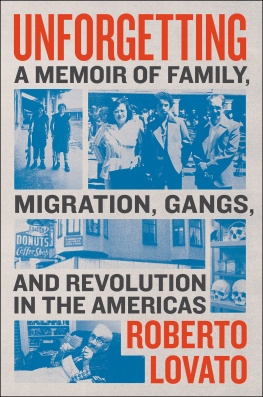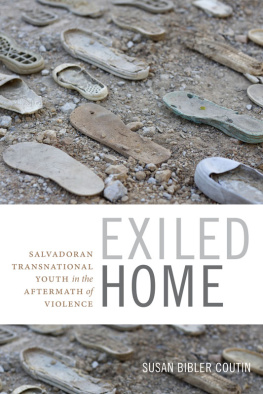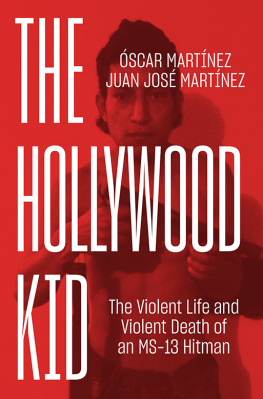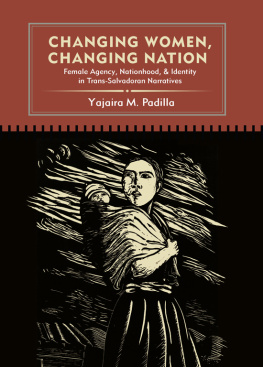
Praise for State of War
In State of War, his gripping, electrifying study of the brutal Salvadoran gang culture, William Wheeler dramatizes with almost painful immediacy a vital truth: that all the fevered talk about a crisis at the border is really an ignorant lament about what three decades of U.S. foreign policy have wrought. At its core, the so-called crisis is about what we as Americans have done to El Salvador and its Central American neighbors. To confront the savage violence ripping through those countries and sending their citizens on a desperate flight north is ultimately to find oneself gazing at the American face in the mirror. With his vivid prose and intrepid reporting, Wheeler has shown us the bloody consequences borne by real peopleand given us a powerful, unforgettable book.
Mark Danner,
author of The Massacre at El Mozote
and Spiral: Trapped in the Forever War
Brisk, chilling examination of El Salvadors descent into violence and the role of notorious transnational gang MS-13. Journalist Wheeler combines a clear sense of geopolitical history and gutsy on-the-ground reporting, producing a compact tale of a slow-motion, violent societal collapse.
Kirkus Reviews
State of War
MS-13 and
El Salvadors
World of Violence
State of War
MS-13 and
El Salvadors
World of Violence
William Wheeler
COLUMBIA GLOBAL REPORTS
NEW YORK
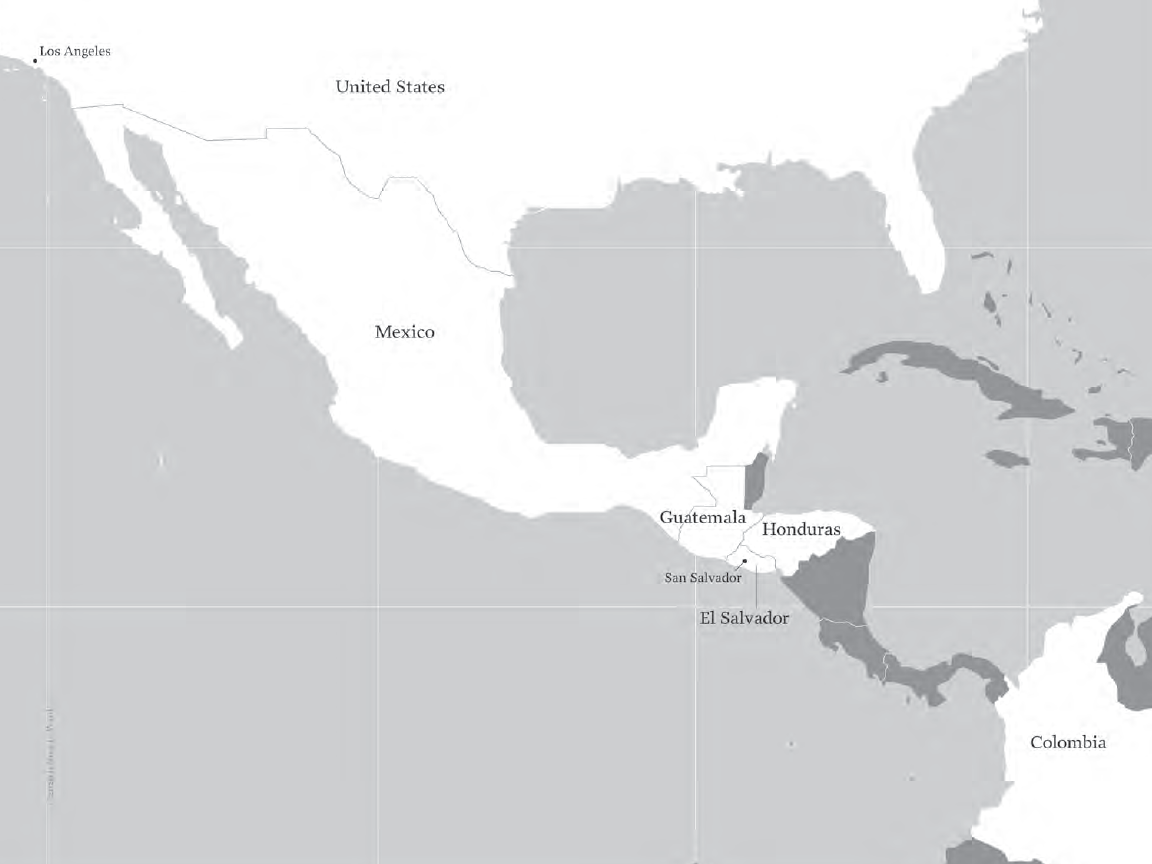
State of War
MS-13 and El Salvadors World of Violence
Copyright 2020 by William Wheeler
All rights reserved
Published by Columbia Global Reports
91 Claremont Avenue, Suite 515
New York, NY 10027
globalreports.columbia.edu
facebook.com/columbiaglobalreports
@columbiaGR
Library of Congress Control Number: 2019952210
ISBN: 978-1-7336237-2-8
E-book ISBN: 978-1-7336237-3-5
Book design by Strick&Williams
Map design by Jeffrey L. Ward
Author photograph by Miranda Sita
Printed in the United States of America
For my family
CONTENTS
Chapter One
A Large Scale Exodus
Chapter Two
The Iron Fist
Chapter Three
Truce
Chapter Four
It Was Like an Army
Chapter Five
Ministry of Defense
Chapter Six
Triangle of Power
TIMELINE
October 15, 1979The Revolutionary Government Junta overthrows the right-wing military regime of President Gen. Carlos Humberto Romero in a coup. The U.S. administration of Jimmy Carter fears the country will fall to a leftist, communist uprising, and throws its support behind the new military government with millions of dollars in arms and spending. The junta violently represses civilians and the leftist guerrilla group Farabundo Mart National Liberation Front (FMLN), and many Salvadorans flee to the U.S. for safety.
March 24, 1980Archbishop of San Salvador scar Romero calls on the military and death squads to refuse government orders to kill civilians, and is assassinated during Mass. A quarter of a million people attend his funeral a week later as government-ordered snipers shoot and kill forty-two mourners. The outrage and the following insurrection of the FMLN mark the start of the Salvadoran Civil War.
MS-13 is founded in Los Angeles in the same year.
December 11, 1981A Salvadoran army unit, the Atlacatl Battalion, founded, equipped, trained, and directed by U.S. military advisers in El Salvador, kills as many as one thousand unarmed civilians accused of collaborating with the FMLN in the infamous El Mozote Massacre. The Reagan administration backs the junta by denying the massacre, calling it leftist propaganda spread by the FMLN.
1982The Nationalist Republican Alliance (ARENA), an extreme right-wing party, wins parliamentary elections marked by violence. The civil war and government massacres of civilians continue. U.S. officers take on leadership positions in the Salvadoran military to run the war. The Reagan administration increases military aid to El Salvador to $2 million a day.
1984Christian Democrat Jos Napolen Duarte wins the presidency against the ARENAs Army Major Roberto DAubuisson, becoming the first Salvadoran civilian president since 1931. Military continues its war against the FMLN. Army massacres and attacks by death squads organized by DAubuisson continue.
1989ARENA candidate Alfredo Cristiani voted president in elections widely believed to have been rigged; FMLN attacks intensify in an offensive aimed at toppling Cristiani.
1991Bush administration approves $42.5 million in military aid to El Salvadors government. Death squad killings continue. Peace talks between ARENA and FMLN begin.
January 16, 1992The ARENA government and the FMLN sign UN-sponsored Chapultepec Peace Accords, ending the civil war. Over 12 years, more than 80,000 people were killed, half a million fled El Salvador as refugees, and half a million more were internally displaced. The FMLN is recognized as a political party.
1996Bill Clinton signs into law the Illegal Immigration Reform and Immigrant Responsibility Act of 1996, resulting in the deportation of many MS-13 gang members to El Salvador. MS-13 and Barrio 18 become more powerful in El Salvador and the Northern Triangle.
2003President Francisco Flores Prez launches iron fist measures to combat the gangs, calling it Plan Mano Dura, reviving his ARENA partys political prospects.
2004ARENA candidate Antonio Saca wins presidential elections in March. In August, he launches Plan Super Mano Dura. In September, following deadly clashes in overcrowded prisons, he accedes to gang demands and assigns the Ciudad Barrios and Quezaltepeque prisons to MS-13 and the Chalatenango and Cojutepeque prisons to Barrio 18, which become de facto headquarters of the gangs leadership.
2009El Salvador becomes the most homicidal country in the world, with a rate of 71 murders per 100,000 people. In March, for the first time since the war, ARENA loses the presidency, as FMLN candidate Mauricio Funes wins presidential elections.
2010JuneA faction of Barrio 18 sets fire to a bus full of civilians, killing seventeen people. President Funes returns to Mano Durastyle laws backed by advertising campaigns.
SeptemberA few days after the Salvadoran Congress approves a new anti-gang law, MS-13 and Barrio 18 demand a public transport strike. The government responds by sending two thousand soldiers to the streets.
2011 SeptemberU.S. adds El Salvador to list of countries considered major producers or transit routes for illegal drugs.
2012 MarchEl Faro breaks the story that the government has secretly negotiated a truce between MS-13 and Barrio 18 factions after transferring their leaders to minimum security prisons.
2013Murder rate in El Salvador drops to 39.4 per 100,000 inhabitants.
2014FMLN congressman Benito Lara approaches gang leaders to reopen talks in order to help party win the elections by mobilizing new voters and intimidating the opposition. ARENA learns about the secret negotiations and holds its own secret meeting with the gangs. Gang members decide to stick with the FMLN. In March, FMLNs Salvador Snchez Cern scores narrow win in presidential election.
JuneCern takes office as the first former rebel to become president and cuts off all support for the truce. Lara is named security minister. The U.S. speeds up deportations to cope with the growing number of migrants from Central America. El Salvador, Honduras, and Guatemala receive millions of dollars to combat gang violence and help those deported from the U.S.
Next page
